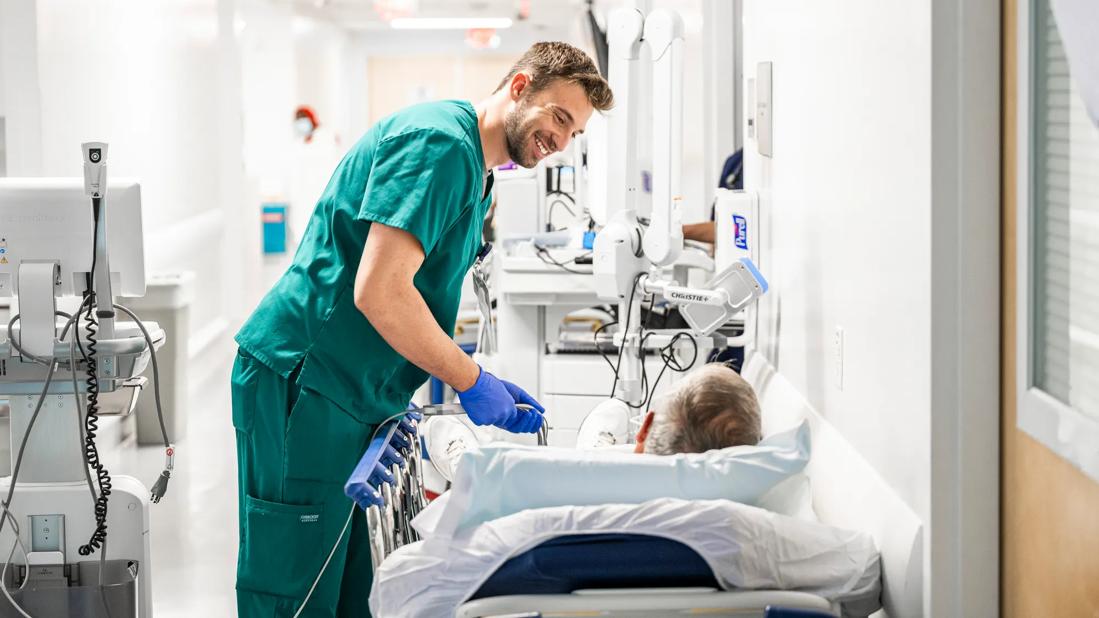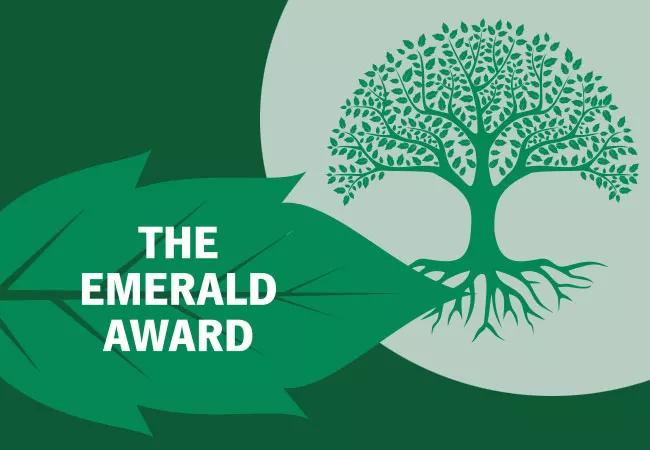New program standardizes support staff recognition

Image content: This image is available to view online.
View image online (https://assets.clevelandclinic.org/transform/29af2773-7b98-4454-aa3b-5d2e8009143f/HRC_3877362_04-25-23_714_MLC-jpg)
patient care nursing assistant
A new Cleveland Clinic program has been developed to recognize the dedication and professionalism of nursing support caregivers.
Advertisement
Cleveland Clinic is a non-profit academic medical center. Advertising on our site helps support our mission. We do not endorse non-Cleveland Clinic products or services. Policy
The EMERALD Award program, launched this fall, honors the key role that support staff members play as part of care teams. Inspired by awards created at several Cleveland Clinic hospitals in Florida and Ohio, the Office of Nursing Education and Professional Development and Marketing collaborated to create the EMERALD Award program for participation across the Cleveland Clinic enterprise.
“Nursing and nursing support staff function as a team to meet the needs of the patient,” says Kathleen Mau, DNP, APRN, NEA-BC, ACCNS-AG, ACNS-BC, CEN, Senior Director, Nursing Education and Professional Development. “Nurses delegate many tasks to nursing support staff, who play a vital role in ensuring the delivery of safe, high quality patient care.”
Cleveland Clinic employs more than 10,000 nursing support staff workers in roles that include patient care nursing assistant, clinical technician, medical assistant, hospital unit assistant and home health aide, to name a few. Depending on their role, these caregivers may assist patients with activities of daily living, collect specimens, record vital signs, support safety and sterile technique in the operating room, or perform clerical duties on the nursing unit.
“Cleveland Clinic hospitals have, individually, offered awards for unlicensed caregivers, but the enterprise did not have a standard award to recognize the exceptional care they provide,” says Mau.

Image content: This image is available to view online.
View image online (https://assets.clevelandclinic.org/transform/bc906548-4988-4c1e-8dfb-e24c924b3890/21-NUR-2358112-Emerald-Award-CQD_650x450_jpg)
Awardees will have demonstrated seven qualities or behaviors to qualify as winners:
EMPATHY: The caregiver treats patients, families and fellow caregivers as they would like to be treated, and they cares for the whole patient, body, mind and spirit.
Advertisement
MODEL: the caregiver serves as a role model, collaborates and shares knowledge to provide the best care possible.
EXCELLENCE: The caregiver holds the highest standards for quality and safety and strives to achieve good outcomes.
RESPECT: The caregiver exhibits respect and professionalism and represents a positive and engaging culture.
ACCOUNTABILITY: The caregiver demonstrates ownership and responsibility for providing exceptional experiences for patients, their families and fellow employees.
LEADERSHIP: The caregiver encourages innovation, welcomes change and always seeks better, more efficient ways to improve patient care.
DEDICATION: The caregiver holds to high moral standards and demonstrates honesty, confidentiality, trust, respect and transparency.
Nominations can be submitted online or on paper by patients, families and caregivers. They will be received and tracked by a program manager, then distributed to a local hospital representative who will vet nominees through human resources, blind the nominations, and then distribute them to the hospital’s review committee for selection. Once an awardee is selected, the representative will coordinate the celebration.
Awardees will be selected and recognized quarterly according to the local hospital’s schedule. Each hospital has been allocated a certain number of annual awards based on size. As an organization, 88 Emerald Awards will be awarded annually. Nursing leaders will announce the EMERALD Award winners in a surprise event in front of their peers.
Advertisement
“Our nursing support staff have always contributed in a vital way,” Mau says. “During the COVID-19 pandemic, we have seen these caregivers going to great lengths to be problem solvers and innovators, and to make the patient experience as good as it can be. We are acutely grateful to have them as team members, and we are happy to have a new way of expressing that.”
Advertisement
Advertisement
Regional organizations collaborate to address nurse faculty shortage
How wellness habits help nurses flourish
Planning continues with critical, patient-focused input from nursing teams
Strengthening care through targeted resources and frontline voices
Embracing generational differences to create strong nursing teams
CRNA careers offer challenge and reward
An unexpected health scare provides a potent reminder of what patients need most from their caregivers
Cleveland Clinic Abu Dhabi initiative reduces ICU admissions and strengthens caregiver collaboration